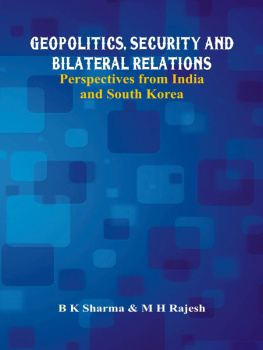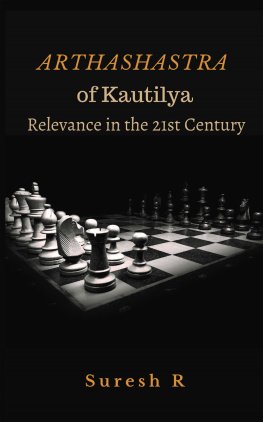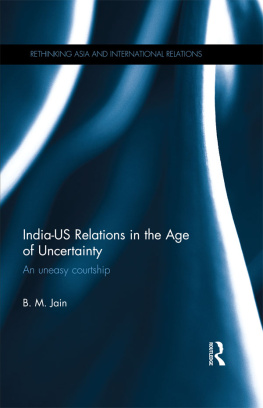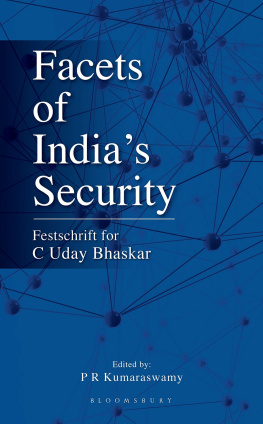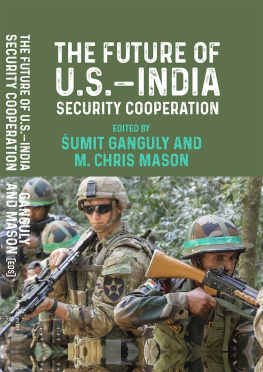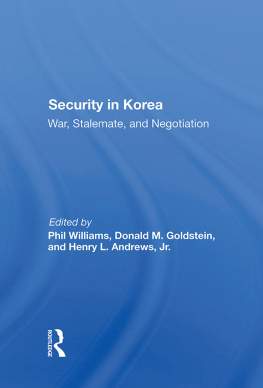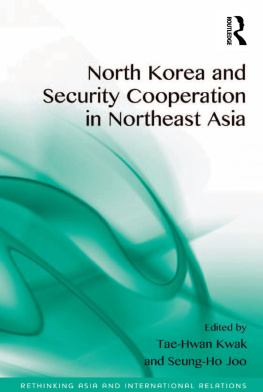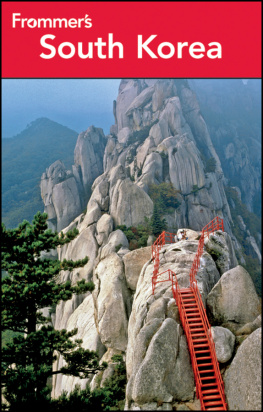Geopolitics, Security and
Bilateral Relations
Perspectives From India and
South Korea
Geopolitics, Security
and Bilateral Relations
Perspectives From India and
South Korea
Edited by
Maj Gen BK Sharma (Retd)
and
Cdr MH Rajesh
United Service Institution of India
New Delhi (India)
A RINSAUSI Joint Research Initiative
Vij Books India Pvt Lt
New Delhi (India)
First Published in India in 2017
Published by
Vij Books India Pvt Ltd
(Publishers, Distributors & Importers)
2/19, Ansari Road
Delhi 110 002
Phones: 91-11-43596460, 91-11-47340674
Fax: 91-11-47340674
e-mail:
web : www.vijbooks.com
Copyright 2017, United Service Institution of India, New Delhi
ISBN: 978-93-85563-83-6 (HB)
ISBN: 978-93-85563-84-3 (ebook)
Price : 695/- (HB)
All rights reserved.
No part of this book may be reproduced, stored in a retrieval system, transmitted or utilized in any form or by any means, electronic, mechanical, photocopying, recording or otherwise, without the prior permission of the copyright owner. Application for such permission should be addressed to the publisher.
The views expressed in this book are of the contributors/editors in their personal capacity and do not represent the views of the USI.
Printed and bound in India
In a significant step, during Prime Minister Narendra Modis visit to South Korea in 2015, India and the Republic of South Korea (RoK), scaled up their bilateral relations to the status of special strategic partnership. A year before that, in 2014 the South Korean Prime Minister Park Geun-hye, was the Chief Guest at the annual Republic Day Parade in New Delhi. The relationship, since then, has grown substantially. Keeping this perspective, the two premier think tanks namely United Service Institution of India (USI) from India and Research Institute for National Security Affairs (RINSA) of Korea National Defence University, Republic of South Korea decided to partner each other to enhance and define the major contours of this bilateral relationship through a joint research project. This book owes its genesis to that decision.
Historically, legend has it that thousands of years ago, Queen Suriratna or Hur Hwang-ok came to Korea from Ayodhya, a historical place in India, This relationship continued during the Buddhist era. Thus the cordial relationship built in the past is continuing and has in fact become more pronounced through the upgradation to Special Strategic Partnership. The changing dynamics post-Cold War brought India and South Korea further close, as liberalization of Indian economy allowed the Korean value chain to invest westwards, and India became a major stopover and a manufacturing hub for the Koreans. Culture followed commerce and the Korean music and serials become a rave in India, (as a part of the global phenomenon of the Korean Halyu wave). Thus a very cordial relationship developed between the two countries which benefitted them immensely.
It is in such a backdrop that United Service Institution of India (USI) and Research Institute on National Security Affairs (RINSA) collaborated on a joint research project namely Geopolitics, Security and Bilateral Relations: Perspective from India and South Korea. Four scholars each from USI and RINSA conducted research on subjects of mutual interest. Given the emerging strategic partnership between India and South Korea, they were tasked to address domains ranging from geopolitics of the regions, bilateral relations, to security cooperation and nuclear issues. The main purpose was to enhance mutual understanding about the newly emerging security environment and examine strategic challenges and opportunities.
The result, are the eight papers published in this book, which I am sure will give readers, both the Indian and South Korean perspectives on matters, relevant to the geo-strategic environment, particularly the Indo-Pacific region and the security concerns, especially the nuclear challenges. Considering both India and South Korea are surrounded by nations who have the proclivity to escalate tensions through lowering the nuclear thresholds, it becomes important to analyse the nuclear dynamics. In addition, approaches to enhance the bilateral relations through expanding economic interactions and political communications were also deliberated. It is hoped, that this book will serve as the starting point to further engagements and research on the subjects which are of importance to both the countries.
Lt Gen PK Singh (Retd)
Director
United Service Institution of India
New Delhi
RINSA
Since India and South Korea established a diplomatic relationship in 1973, the bilateral relations continue to grow across sectors. It is evolved to strategic partnership. Seoul and New-Delhi shares values and interests in several aspects. First of all, India is the largest democracy in the World, while South Korea achieved democratization in a relatively short period. Both countries adopted market economy as an economic system. It is these commonalities that lay the groundwork for bilateral cooperation. With shared political and economic system, they pursue same national objectives of prosperity and security, which are intertwined. Same systems and common interests provide rationales for close collaboration between the two players.
Bilateral economic cooperation demonstrated a good performance over the decades in trade and investment. India appreciates South Korea which boldly took risk to invest in India, which had a bleak prospect of economic success in the early 1990s. South Korea also appreciates India for providing opportunities for expanding market vice versa. On the basis of economic achievement, the two states wanted to expand cooperation to political and defence area. Security cooperation has been included in the seven agreements concluded at the recent summit in Seoul. In an MOU, both sides promised to establish a new communication channel between the National Security Council Secretariat of India and the Office of National Security of South Korea.
Along with accumulated bilateral relations over decades, changing security environment at regional and global level drives cooperation between the two middle powers included in G20. Recently, the term of Indo-Pacific increasingly gained currency among pundits and policy-makers. In the past, Asia-Pacific and East Asia were more popular in defining geographical scope of strategic discussion. Two developments uphold the Indo-Pacific as an emerging regional security construct. With the trends of geopolitics changing rapidly, the dynamics of regional players are transformed. There is no doubt that geopolitics is largely defined by great powers rivalry between the United States and China. Their competition is understood as a product of Chinas rise. Amid increasing tension between the rivalries, growing India became more active and influential player. Prime Minister proclaimed that Look East policy should be replaced by an Act East one during his official visit to Seoul in May 2015.

